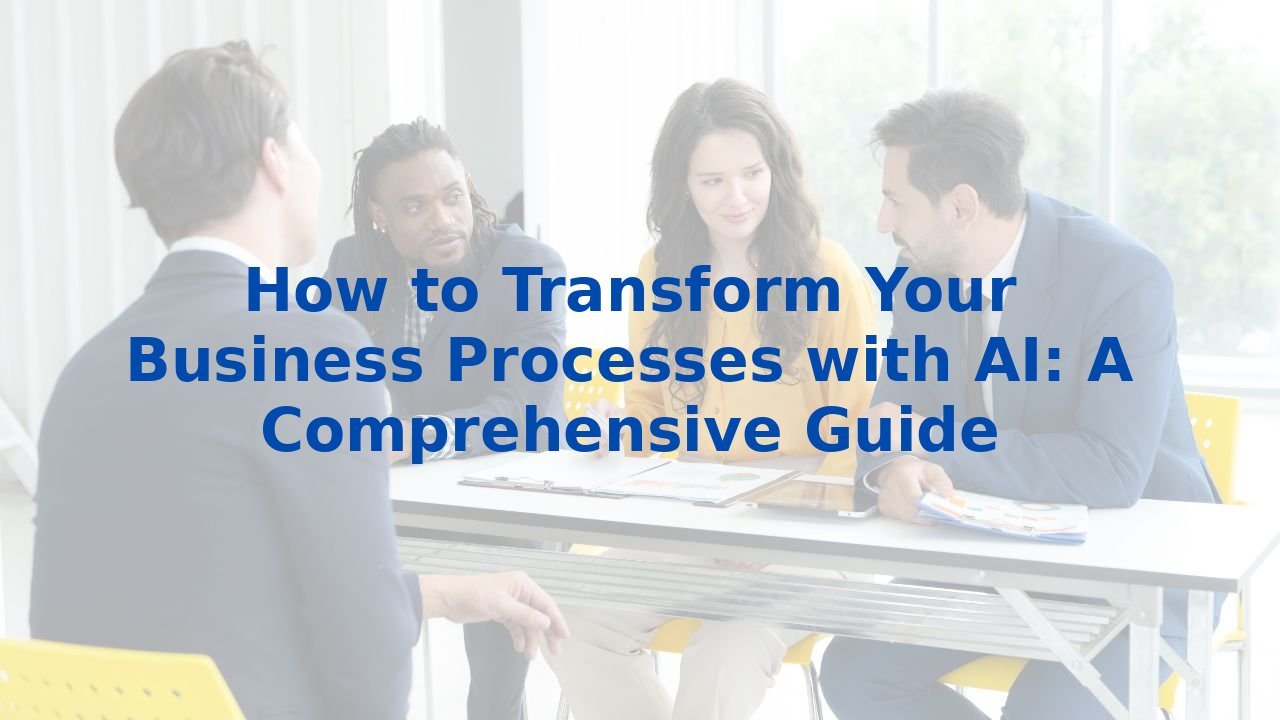How To Transform Your Business Processes With AI: A Comprehensive Guide
How To Transform Your Business Processes With AI: A Comprehensive Guide
In a landscape defined by rapid advancements and a relentless pursuit of efficiency, businesses are increasingly exploring how Artificial Intelligence (AI) can redefine their operational processes. Integrating AI into business process management does not merely automate; it revolutionizes the way organizations operate, making them more agile, responsive, and competitive.
The Integral Role of AI in Business Efficiency
AI's introduction into business processes opens a multitude of avenues for improvement. At its core, AI enhances several key components of business operations: process discovery, automation, data analysis, and continuous improvement. Each of these facets contributes uniquely to not only enhancing efficiency but also amplifying the effectiveness of teams across the organization.
1. Process Discovery and Mapping
A vital first step in any transformation journey is understanding existing workflows. AI brings a new level of insight through process mining techniques. By utilizing advanced pattern recognition and natural language processing, AI can sift through operational data, revealing inefficiencies and bottlenecks previously unnoticed by the human eye. The result? A detailed, data-driven map of an organization’s processes that enables targeted refinements and operational clarity.
2. Streamlined Process Automation
Perhaps the most transformative aspect of AI is its ability to automate repetitive tasks. Implementing AI bots can free your team from mundane activities, allowing them to channel their efforts toward strategic, high-value projects. Automation reduces dependence on manual processes, minimizes errors, and optimizes the use of resources—all while drastically cutting costs. This shift away from routine tasks to creative problem-solving allows teams to elevate their contributions to the organization.
3. Enhanced Data Analysis for Informed Decision-Making
Decision-making has never been more data-driven. AI excels in analyzing vast datasets with speed and accuracy, uncovering trends, predicting outcomes, and providing insights that drive better tactical and strategic decisions. By integrating AI into data analytics, organizations can make informed choices that not only respond to current market conditions but also anticipate future opportunities.
4. Commitment to Continuous Improvement
In an ever-evolving market landscape, continuous improvement is paramount. AI promotes this culture by offering ongoing feedback, data-driven recommendations, and performance insights. This iterative process of evaluation and optimization helps organizations align their business process management strategies with overarching business objectives. The result is a dynamic approach to operations that adapts and evolves in tandem with market needs.
5. Elevating Customer Satisfaction
Customer experiences can also benefit immensely from AI integration. By deploying AI-driven solutions such as chatbots and automated response systems, businesses can provide personalized and prompt customer service. These systems handle routine inquiries swiftly, thus allowing human agents to focus on more complex issues, enhancing both efficiency and customer satisfaction. Furthermore, analytics tools can help businesses glean insights from customer feedback, informing plans for future improvements.
Investing in Employee Training for AI
While the capabilities of AI are profound, it is the human element that must be nurtured. Training employees to effectively engage with AI technologies ensures that they can interpret insights, understand AI-driven recommendations, and seamlessly integrate AI into their workflows. This investment in human capital promotes a culture of continuous learning and equips the team with the necessary skills to adapt as technologies evolve. When individuals are empowered to harness AI, organizations see optimized processes and more informed decision-making at every level.
Conclusion
The integration of AI into business processes is not merely a trend; it represents a paradigm shift in operational capabilities. By emphasizing process discovery, automation, enhanced data analysis, and a commitment to continuous improvement, organizations can unlock efficiencies that significantly impact their bottom line. As businesses continue to navigate an ever-changing landscape, investing in AI technologies and employee training will be crucial to remaining competitive and responsive to emerging market demands.
For those ready to take the leap into AI, it’s essential to start with a clear understanding of your goals and the processes you intend to enhance. As businesses harness the power of AI, the promise of a more efficient, strategic, and beneficial operational model is within reach.



